Home > News > The Prime Minister in Action > August 2012 > The Prime Minister Attends the Hiroshima Peace Memorial Ceremony, and Other Activities
The Prime Minister Attends the Hiroshima Peace Memorial Ceremony, and Other Activities
Monday, August 6, 2012
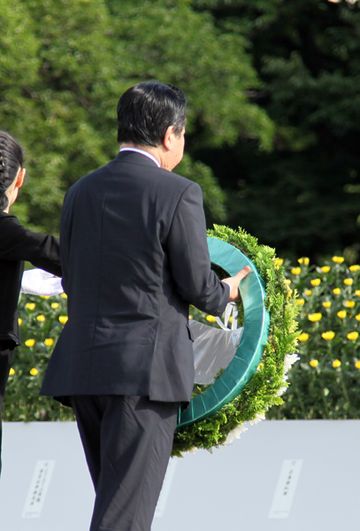
Photograph of the Prime Minister offering flowers at the Hiroshima Peace Memorial Ceremony
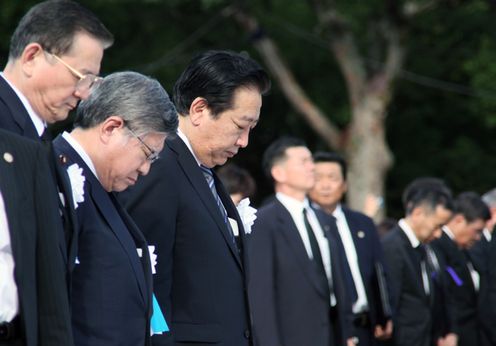
Photograph of the Prime Minister offering a silent prayer at the Hiroshima Peace Memorial Ceremony
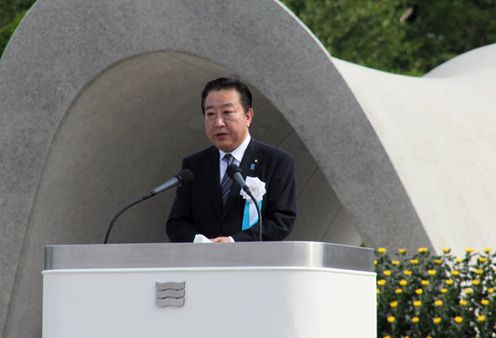
Photograph of the Prime Minister delivering an address at the Hiroshima Peace Memorial Ceremony
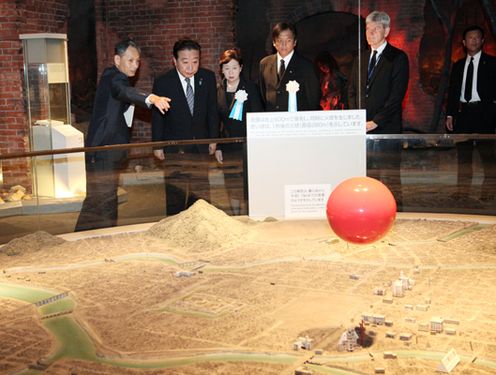
Photograph of the Prime Minister visiting the Hiroshima Peace Memorial Museum
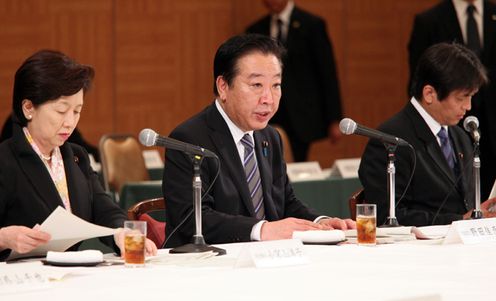
Photograph of the Prime Minister attending a meeting to listen to requests by representatives of atomic bomb victims
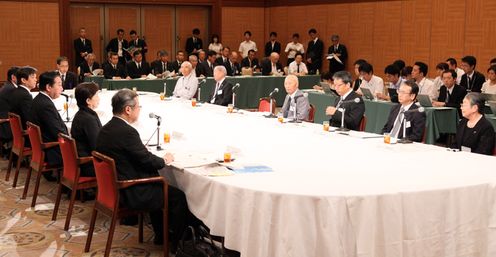
Photograph of the Prime Minister listening to requests by representatives of atomic bomb victims
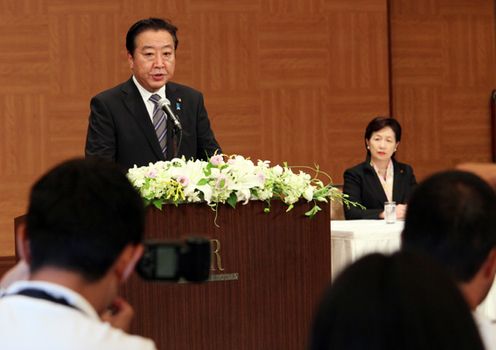
Photograph of the Prime Minister at a press conference
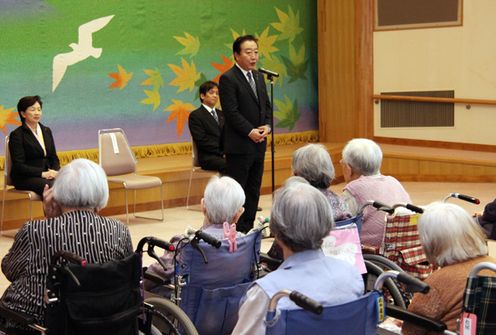
Photograph of the Prime Minister visiting a nursing home for atomic bomb survivors, Kurakake Nozomi-en 1
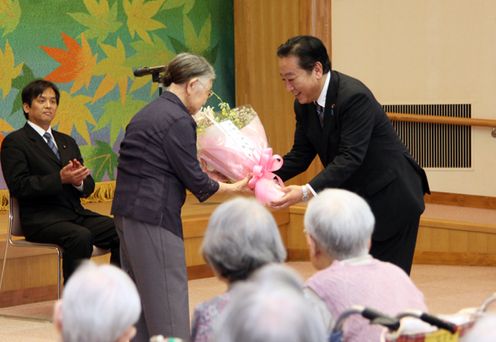
Photograph of the Prime Minister visiting a nursing home for atomic bomb survivors, Kurakake Nozomi-en 2
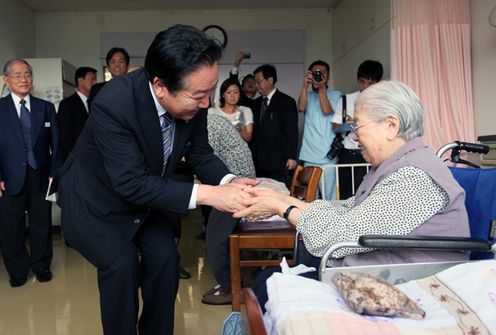
Photograph of the Prime Minister visiting a nursing home for atomic bomb survivors, Kurakake Nozomi-en 3
Prime Minister Yoshihiko Noda attended the annual Hiroshima Peace Memorial Ceremony held in the Peace Memorial Park in Hiroshima City.
Approximately 50,000 people including atomic bomb victims and bereaved family members, as well as representatives of 71 nations and the European Union, attended the ceremony marking the 67th anniversary of the atomic bombing.
Mr. Kazumi Matsui, Mayor of Hiroshima City, and the representatives of the bereaved family members added the names of people recognized as atomic bomb victims in the past year to the cenotaph and, furthermore, Prime Minister Noda and other participants led by the representatives of the bereaved family members and the atomic bomb victims offered flowers. Afterwards, the Peace Bell was rung at 8:15 a.m., when the atomic bomb was dropped, and all the participants offered a minute of silent prayer.
In the Peace Declaration, Mayor Matsui called for the abolishment of nuclear weapons, and spoke of the necessity of passing on the experiences of the atomic bombing, saying, "Hiroshima was plunged into deepest darkness. Our hibakusha experienced the bombing in flesh and blood. Then, they had to live with aftereffects and social prejudice. Even so, they soon began telling the world about their experience. Transcending rage and hatred, they revealed the utter inhumanity of nuclear weapons and worked tirelessly to abolish those weapons. We want the whole world to know of their hardship, their grief, their pain, and their selfless desire."
Following the recital of the Promise for Peace by local elementary school students Mr. Ryuki Miho and Ms. Mayu Endo, representing children,
Prime Minister Noda delivered an address, in which he expressed his sympathy for the victims and said, "Humankind must never forget the horror of nuclear weapons. Nor must the tragedy that unfolded in Hiroshima and is etched in annals of human history ever be repeated. As the only country to have experienced the horror of nuclear devastation in war, Japan bears a noble and grave responsibility to all of humankind and to the future of our planet. That responsibility is to pass on the memories of our tragic experiences to future generations and to see to it that the passion and desire for action to realize 'a world without nuclear weapons' spreads around all over the world.
Today, 67 years on from the atomic bombing of Hiroshima, on behalf of the Government of Japan, I pledge that Japan will observe its Constitution and firmly maintain the Three Non-Nuclear Principles for the sake of the ultimate elimination of nuclear weapons and the realization of eternal world peace.
With the passage of 67 years, those people who can speak directly about their experiences of the atomic bombing are now advanced in years. We are reaching a stage of critical importance in historical terms with regard to passing on the experiences of the atomic bombing.
Disarmament and non-proliferation education is of the greatest importance as a social foundation from which to renew and refresh memories. Those who implement such education need not necessarily be limited to the public sector. Already a wide range of bodies are engaged in diligent activities, including research and educational institutions, non-governmental organizations (NGO) and the media. Above all, we should always remember that the direct actions of the people of Hiroshima themselves provide a significant driving force. I would like to express my appreciation once again to all of the 'Special Communicators for a World without Nuclear Weapons' for their activities of travelling to 49 locations around the world to share the experiences of Hiroshima with people overseas. The Government of Japan will continue to highlight the importance of 'a world without nuclear weapons' and will push forward with various kinds of efforts to ensure that memories of Japan's atomic bomb experiences are passed on, both across national borders and across generations."
The Prime Minister also said, "More than one year has passed since the Great East Japan Earthquake and the accident at Tokyo Electric Power Company's Fukushima Daiichi Nuclear Power Station. Many people from Hiroshima have devoted themselves to the rebirth of Fukushima and have provided various kinds of assistance. The Government will spare no effort in the rebuilding of infrastructure for daily life, including decontamination operations, to ensure that the residents of Fukushima who are still enduring discomfort and inconvenience in their everyday activities can return to their normal daily lives as soon as possible. Furthermore, we aim to establish an energy structure in the mid to long-term in a form that will be reassuring for the people of Japan, under a basic policy of reducing our dependence on nuclear power."
After the ceremony, Prime Minister Noda visited the Hiroshima Peace Memorial Museum. The Prime Minister then moved to a hotel in Hiroshima City and attended a meeting to listen to requests by representatives of atomic bomb victims, and heard requests from the representatives from seven groups of atomic bomb victims and others, following which he attended a press conference.
Afterwards, the Prime Minister visited a nursing home for atomic bomb survivors in Hiroshima, Kurakake Nozomi-en.









